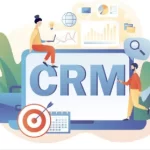In today’s fast-paced business environment, effective customer relationship management (CRM) is crucial for success. For businesses in Dallas, selecting the right CRM software can significantly enhance operations, improve customer interactions, and drive growth. This article explores some of the best CRM solutions available, their features, and how they can benefit your business.
What is CRM Software?
CRM software is a technology that helps businesses manage and analyze customer interactions and data throughout the customer lifecycle. It aims to improve customer service relationships, assist in customer retention, and drive sales growth. By consolidating customer information into a single database, CRM systems enable businesses to streamline processes and improve profitability.
Key Features of CRM Software
When evaluating CRM software, consider the following essential features:
- Contact Management: Efficiently manage customer information and interactions.
- Sales Automation: Automate repetitive tasks to increase productivity.
- Reporting and Analytics: Access insights to make informed decisions.
- Integration Capabilities: Seamlessly connect with other business tools.
- Customization Options: Tailor the software to meet specific business needs.
Top CRM Solutions for Dallas Businesses
Salesforce
Overview: Salesforce is one of the most recognized CRM platforms globally, offering a comprehensive suite of tools for sales, marketing, and customer service.Key Features:
- Extensive customization options
- Robust reporting and analytics
- Integration with various third-party applications
Benefits: Ideal for large enterprises due to its scalability and flexibility, Salesforce allows businesses to tailor their CRM experience according to their unique needs.
HubSpot CRM
Overview: HubSpot CRM is a user-friendly platform that provides essential tools for managing customer relationships without the hefty price tag.Key Features:
- Free version available
- Email tracking and notifications
- Pipeline management
Benefits: HubSpot’s intuitive interface makes it an excellent choice for small to medium-sized businesses looking to grow without overwhelming complexity.
Zoho CRM
Overview: Zoho CRM offers a cost-effective solution with a wide range of features suitable for small businesses.Key Features:
- Sales automation
- Lead management
- Analytics tools
Benefits: With its affordability and extensive functionality, Zoho CRM is perfect for startups aiming to establish a solid customer relationship foundation.
Microsoft Dynamics 365
Overview: Microsoft Dynamics 365 combines CRM and ERP capabilities, making it a powerful tool for businesses looking to integrate various functions.Key Features:
- Unified interface across applications
- Advanced data analytics
- Customizable dashboards
Benefits: This platform is particularly beneficial for organizations already using Microsoft products, as it facilitates seamless integration across systems.
Pipedrive
Overview: Pipedrive focuses on sales pipeline management, helping teams track deals through various stages.Key Features:
- Visual sales pipeline
- Activity reminders
- Email integration
Benefits: Pipedrive’s straightforward approach makes it ideal for sales teams looking to enhance their closing rates without unnecessary complexity.
Choosing the Right CRM for Your Business
Selecting the best CRM software involves considering several factors:
- Business Size: Larger companies may require more robust solutions like Salesforce or Microsoft Dynamics 365, while smaller businesses might find HubSpot or Zoho more suitable.
- Budget Constraints: Evaluate your budget against the features offered by each platform. Many CRMs offer free trials or tiers that can help you assess their value before committing financially.
- Specific Needs: Identify what features are most important for your business. For example, if sales automation is a priority, look at solutions like Pipedrive or Zoho.
- User Experience: A user-friendly interface can significantly impact adoption rates among your team members. Consider platforms that offer intuitive designs.
- Scalability: Choose a CRM that can grow with your business. Look for options that offer additional features or integrations as your needs evolve.






